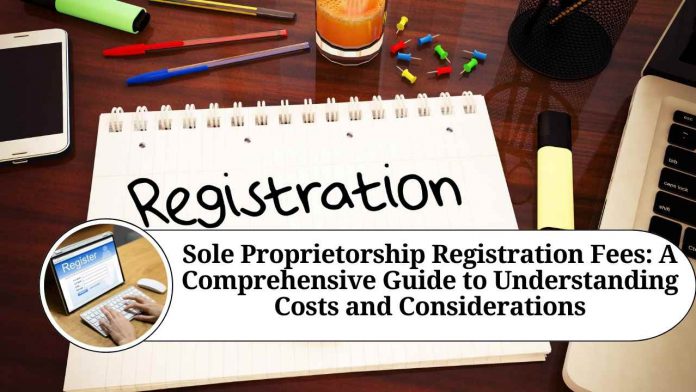Introduction:
When starting a business as a sole proprietor, one of the crucial steps is registering your business. Sole proprietorship is the simplest form of business structure, where an individual operates and owns the business entirely. While the process of registering a sole proprietorship may seem straightforward, it’s essential to be aware of the associated costs, including registration fees. In this blog post, we will delve into the concept of sole proprietorship registration fees, their significance, and factors to consider when budgeting for this expense.
What are Sole Proprietorship Registration Fees?
Sole proprietorship registration fees refer to the costs incurred when officially establishing your business as a sole proprietor. These fees are generally payable to the appropriate government agency responsible for business registrations, which may vary depending on your country or region.
Significance of Sole Proprietorship Registration Fees:
- Legitimacy and Compliance: Registering your sole proprietorship provides legal recognition to your business. It ensures compliance with government regulations and allows you to operate within the framework of the law.
- Business Identity: Registration allows you to acquire a unique business name, preventing others from using it and establishing your brand identity in the market.
- Access to Business Services: Many banks, financial institutions, and government agencies require proof of business registration to provide services such as business bank accounts, loans, and permits.
- Consumer Trust: A registered sole proprietorship inspires trust and confidence among customers, suppliers, and potential business partners.
Factors Affecting Sole Proprietorship Registration Fees:
The registration fees for a sole proprietorship can vary based on several factors:
- Jurisdiction: Registration fees are determined by the local government or regulatory body responsible for business registrations in your area. Different countries, states, and regions may have varying fee structures and scales.
- Business Structure: The registration fees might differ depending on the type and size of the business you intend to establish. Some jurisdictions may offer reduced fees for micro or small enterprises to encourage entrepreneurship.
- Additional Licenses or Permits: Certain industries or professions may require additional licenses or permits. These could incur extra fees on top of the basic sole proprietorship registration costs.
- Expedited Processing: If you need your registration to be processed faster than the standard turnaround time, some jurisdictions offer expedited services for an additional fee.
Tips for Budgeting Sole Proprietorship Registration Fees:
- Research Local Requirements: Start by understanding the specific registration process and fee structure in your jurisdiction. Visit the official website of the relevant government agency or consult with a business advisor to obtain accurate and up-to-date information.
- Consider Additional Costs: While registration fees are a significant part of the process, remember to factor in any additional expenses, such as licenses, permits, legal assistance, or professional advice that you might require during registration.
- Create a Business Plan: Developing a comprehensive business plan helps you estimate your initial expenses, including registration fees. A well-structured plan can also assist you in obtaining financial support or loans, if necessary.
- Explore Government Assistance: Some jurisdictions offer support programs or subsidies for startups and small businesses. Research whether you qualify for any cost-reduction initiatives that could help lower your registration fees.
Conclusion:
Registering your sole proprietorship is an essential step towards establishing a legitimate business presence. While the exact registration fees for a sole proprietorship vary depending on your jurisdiction and other factors, it’s crucial to allocate funds and include these costs in your initial budget. By understanding the significance of registration fees and preparing for the associated expenses, you can ensure a smooth and legal start to your entrepreneurial journey.
Other Related Blogs: Section 144B Income Tax Act
Frequently Asked Questions (FAQs)
Q.What is the purpose of paying registration fees for a sole proprietorship?
Sole proprietorship registration fees are paid to obtain legal recognition for your business, establish its identity, and comply with government regulations.
Q.How much do sole proprietorship registration fees typically cost?
The cost of registration fees varies depending on your jurisdiction. It can range from a nominal fee to several hundred dollars.
Q.Are there any ongoing fees or renewal charges for a sole proprietorship?
In some jurisdictions, there might be annual or periodic renewal fees to keep your sole proprietorship registration active. Research the requirements specific to your location.
Q.Can I deduct sole proprietorship registration fees as a business expense?
In many cases, yes. Sole proprietorship registration fees are generally considered deductible business expenses. However, it’s advisable to consult with an accountant or tax professional for accurate advice.
Q.Can I register a sole proprietorship without paying any fees?
Most jurisdictions require payment of registration fees to complete the process of establishing a sole proprietorship. However, some regions may offer fee waivers or reduced fees for certain categories of businesses.
Q.What additional costs should I consider apart from the registration fees?
Additional costs may include obtaining business licenses, permits, professional advice or assistance, and potentially legal services, depending on your specific industry or local requirements.
Q.Can I register a sole proprietorship online?
Many jurisdictions offer online registration services, allowing you to complete the process conveniently from anywhere with an internet connection. Check with your local government agency to see if online registration is available.
Q.Are there any financial assistance programs to help with sole proprietorship registration fees?
Some regions provide support programs or subsidies for startups and small businesses. Research local government initiatives to determine if any financial assistance is available to reduce registration fees.
Q.How long does it take to complete the sole proprietorship registration process?
The time required for registration varies depending on your jurisdiction. It can range from a few days to several weeks. Expedited processing options may be available for an additional fee.
Q.Can I register a sole proprietorship under a different name than my own?
Yes, in most cases, you can choose a business name that differs from your personal name. However, certain jurisdictions have rules and guidelines regarding business names. It’s important to check the requirements in your area.




















